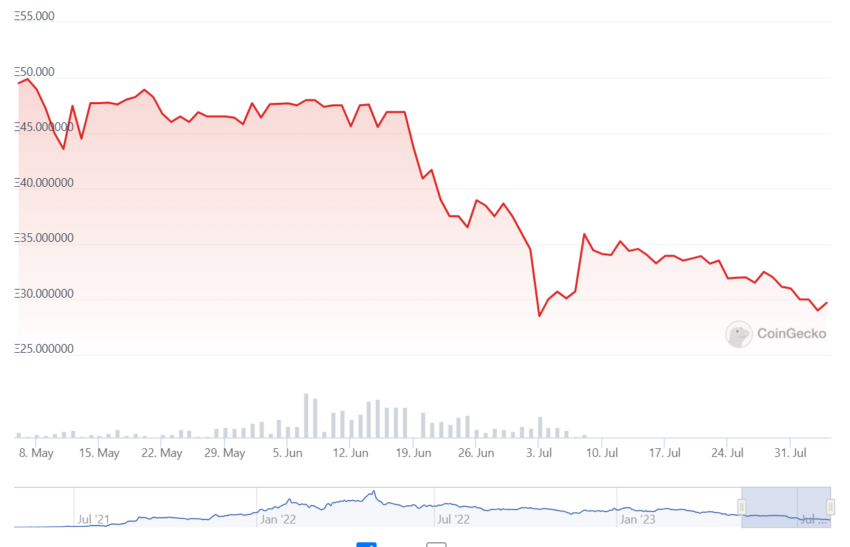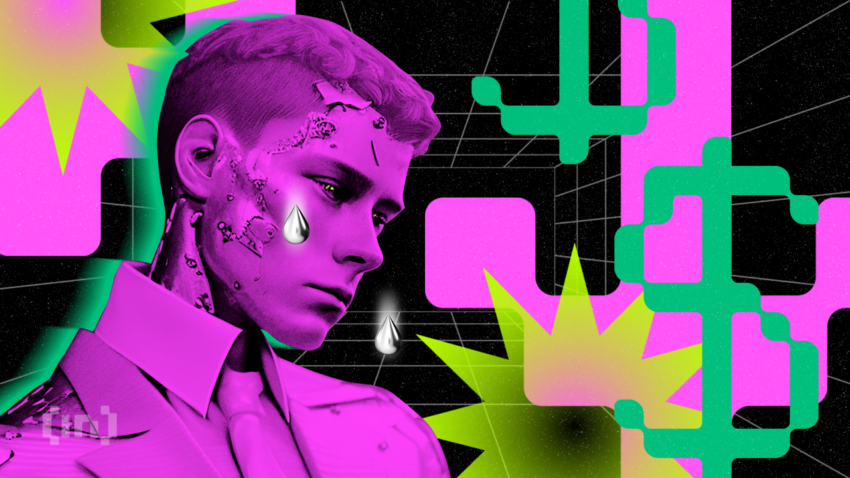The non-fungible token (NFT) market has had another rough month, according to the latest report from DappRadar. The question is, how long can the pain last?
NFT trading volume dropped by 29% to $632 million in July, and the total number of NFT sales also fell by 23% to 3.7 million. That follows a previous report from DappRadar, which showed NFT trading volume dropped 38% in the second quarter of this year.
NFT Market Dropping Almost Every Month
Before that, in June, the company registered a 44% dip in unique daily unique active wallets in the NFT sector. A month before that, in May, DappRadar saw a 44% drop in NFT trading volume.
This month, the market continued to contract. DappRadar noted a 19% decrease in dUAW to 70,338, making up only 4% of the industry’s total activity.

But it wasn’t just non-fungible tokens suffering. The total value locked (TVL) in the DeFi sector decreased slightly by 2.27% and now stands at $75.91 billion. However, DeFi’s pain is unlikely to bring NFT traders any joy.
Blockchain analyst Sara Gherghelas, who helped compile the research, told BeInCrypto that the overall market downturn since the second half of 2022 was partly to blame for the market’s troubles.
After all, they are closely linked to the price of Bitcoin (BTC) and Ethereum (ETH). However, Gherghelas also cited other reasons.
Still wondering what an NFT is? Look no further: NFTs Explained: What Are Non-fungible Tokens and How Do They Work?
NFT Trading Volume Down Over 90% Since January 2022
Gherghelas said that wild hype and speculation around NFTs led to many “scams and rug pulls.” She continued:
“Some people have questioned the value of NFTs, arguing that they are simply digital assets that can be easily copied. As a result of these factors, the NFT market has cooled significantly in 2023. The total trading volume of NFTs has fallen by more than 90% since its peak in January 2022. The average price of an NFT has also fallen by about 70%.”
Pavel Bains, CEO of Bluzelle, was less pessimistic about the state of the market than most. He cited the possibility NFTs could eventually replace player-owned assets, including skins in games like PUBG, DOTA, or CS:GO, as a way forward for the technology.

“NFTs have unlocked a range of utilities for companies and enterprises, making them a game-changer for both Web2 and Web3 ecosystems. While currently experiencing a brief lull, the NFT scene remains resilient. The temporary slump can be attributed to a mild liquidity reduction and prevailing negativity. As the real-world applications of NFTs continue to expand, it’s only a matter of time before enthusiasm reignites,” he continued.
However, it’s hard to deny that trading in profile picture (PFP) NFTs that claim to build exclusive Web3 communities is being hit hard. According to CoinGecko, the floor price for Bored Ape Yacht Club (BAYC) tokens—the most well-known brand in the industry—is on a long-term decline.
As interest in PFPs dwindles, the industry is looking at utility NFTs, and use cases like ticketing, to prove that the technology is more than just expensive JPEGs.
Disclaimer
In adherence to the Trust Project guidelines, BeInCrypto is committed to unbiased, transparent reporting. This news article aims to provide accurate, timely information. However, readers are advised to verify facts independently and consult with a professional before making any decisions based on this content. Please note that our Terms and Conditions, Privacy Policy, and Disclaimers have been updated.


